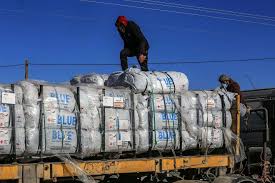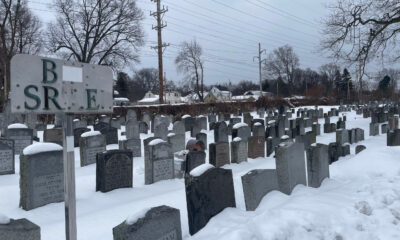Uncategorized
Israel’s “starvation plan” for Gaza.

The world rushes to judgement
By GREGORY MASON (May 28, 2025) Israel’s re-imposition of a blockade on food and other necessities of life flowing into Gaza produced the expected hail of condemnation from the usual suspects. Typical was the reaction by Alex de Waal writing on UnHerd (May 22, 2025), a blog that prides itself on swimming against the current. De Wael writes:
“It seems monstrous, as we watch children in Gaza wasting before our eyes. But in truth, the weaponisation of food in counterinsurgency is nothing new.”
He continues to place Israel’s current blockage in the same category as infamous starvation programmes intended to demoralize a population, such as the British campaign of the fifties to suppress the Malayan counterinsurgency. This is a crude characterization of Israeli goals and motivations for the renewed military push into Gaza and the blockade on food aid.
Benny Morris, the noted Israeli historian, also expressed doubts about this strategy, although in a more nuanced tone than de Wael. Writing in Quillette magazine (May 24, 2025), he stated:
“Meanwhile, Israel’s international position dramatically worsened. EU member states and Canada have imposed minor sanctions against the Jewish state and threaten worse. Observers in Jerusalem have warned that Israel faces an international relations “tsunami.” In Washington, Israel’s staunchest ally, President Donald Trump’s aides, speaking anonymously, told The Washington Post that a break with Israel is likely if it does not end its war-making in the Gaza Strip.”
And more concretely on the withdrawal of food, fuel and medical supplies on March 2, 2025, he writes,
“Western public opinion and European governments are driven by daily TV clips from Gaza showing dead and dying women and children, though never dead and dying combat-age males. They are also influenced by worsening humanitarian conditions on the ground—Trump has even spoken hyperbolically of “a lot of people starving,”
The allegation that Israel has starved the Gaza population is a fabrication. According to the World Food Program, 94.000 tons of food can feed one million people for four months. During the first months of 2025, up to the most recent Israeli blockade, Gaza received 380,000 tons of supplies, sufficient to feed its population of 2.1 million for eight months. What happened to the extra supplies?
In a word, Hamas intercepted the supplies, allowed some to dribble to the civilian population, but then sold most to local merchants at widely inflated prices, to pay salaries to its fighters and acquire more military equipment. This expropriation has been an open secret for years. Hamas has diverted all the well-meaning aid from the West to create the military infrastructure and to support the lavish lifestyles of its political leadership in Qatar. For example, the late Ismail Haniyeh was estimated to have a net worth of $4 – $6 billion at the time of his assassination.
The current Israeli call-up of 30,000 reservists and deployment of regular troops into Gaza was triggered by the refusal of Hamas to agree to the release of 10 hostages, the cessation of all hostilities, and to lay down its arms. It did not occur out of a vacuum.
Israel’s stated goals for the current action in Gaza are to recover all hostages (estimated dead (39) and alive (20), control of Gaza militarily, the complete elimination of Hamas, and forcing the civilian population into areas where they can receive food aid without interference.
Notably, while the Geneva Convention requires all combatants to care for civilian populations, if one party subverts the distribution of aid, the other parties are no longer obligated to provide food aid. Under this criterion, the diversion of aid by Hamas appears to have obviated Israel’s legal requirement to distribute aid to Gaza,
But legality and political reality diverge especially when it comes to Israel. Quite simply, Israel has always struggled with public relations and communication. In contrast, the messages of Hamas have a fertile field of skepticism by much of Western media that seems ready to believe the worst of Israeli intentions. The recent statements of Starmer, Macron, and Carney neatly capture this deep confusion among Western leaders. Recent developments regarding food supplies to Gaza may force these virtue signalers to reconsider their stance; however, that’s a slim chance.
A hopeful development, if anything about Gaza can be promising, is the creation of a US-based NGO, the Gaza Humanitarian Foundation (GHF), which will manage food distribution to the civilian population under the protection of the Israel Defence Forces (IDF). After initial glitches triggered by Hamas interference, aid appears to be flowing to the civilian population. IDF reports cautiously claim that the limited capacity of Hamas to impede food distribution, as well as increased boldness of the population to defy Hamas, indicate its weakness.
As with everything about Gaza, the food aid situation is volatile, but some grounds exist for cautious optimism that mass starvation has been averted.
Uncategorized
Spike Lee, Kyrie Irving wear pro-Palestinian outfits to NBA All-Star Game featuring first Israeli player
(JTA) — Deni Avdija scored five points and made four assists and one dunk in his first NBA All-Star Game — the first All-Star appearance ever for an Israeli player.
But while Avdija’s Team World squad fell short against the league’s top American players, his appearance continued to generate excitement for Israelis, who have viewed his success on the court as a matter of national pride.
Avdija’s jersey featured an Israeli flag on the back, in keeping with the uniform for Team World.
“I feel like when I come to play, I come with the entire nation, and it’s fun to show that it’s possible, even for a small country like us,” he said during a postgame press conference, in which most questions were asked and answered in Hebrew.
Lebron James, too, was asked by an Israeli reporter about Avdija’s performance and about Israel during his own postgame availability.
“I hope I inspire people over there not only to be great in sports, but to be better in general in life,” James said. “Hopefully, someday I could make it over there. Like I said, I’ve never been over there, but I’ve heard nothing but great things. I appreciate the question.”
Some cultural events featuring prominent Israelis since the start of the war in Gaza have been subject to anti-Israel demonstrations. There were no disruptions at the All-Star Game, but two prominent fans wore outfits designed to show pro-Palestinian solidarity.
The filmmaker Spike Lee wore a Palestinian flag-inspired outfit, with a keffiyeh-patterned sweater and flag badges on his bag strap.
The basketball player Kyrie Irving, meanwhile, wore a T-shirt that said “PRESS” on the front. The shirt, produced by the company Wear the Peace, says inside that it is “dedicated to our beloved journalists in Gaza showing the world the truth.” Irving had previously worn the shirt to another NBA game.
Irving, who was not playing in the All-Star Game, was traded to the Dallas Mavericks from the Brooklyn Nets in 2023 shortly after promoting an antisemitic film on his Twitter account and at first refusing to apologize for the tweet.
The post Spike Lee, Kyrie Irving wear pro-Palestinian outfits to NBA All-Star Game featuring first Israeli player appeared first on The Forward.
Uncategorized
As the last generation of Holocaust survivors die, is AI the future of Holocaust education?

At a Brooklyn synagogue on a recent Monday afternoon, a video of Holocaust survivor Sonia Warshawski played on a two-foot-tall box. Seated in a leopard-print chair, her hands folded in her lap, Warshawski blinked and nodded her head expectantly on a continuous loop.
“Did anyone else from your family survive?” a Hebrew school student asked the AI-powered avatar.
The video cut to a separate clip. Warshawski said she and her sister had survived. Her brother, mother and father did not.
Warshawski, who survived three concentration camps and ran a tailoring shop in Kansas City until 2023, had made it part of her life’s mission to tell her story wherever she could. She spoke with students, filmed the 2016 documentary Big Sonia about her life, and was even a guest speaker at a local prison.
But Warshawski knew she wouldn’t live forever. So in 2021, with the help of the interactive media company StoryFile and her granddaughter’s production company, Inflatable Film, Warshawski recorded answers to hundreds of questions about her life, from “What do you remember about the death march?,” to “Why do you like leopard print so much?” Those answers were loaded into an AI-powered avatar of Warshawski that can converse through a video screen, which debuted as an exhibit at the Museum of Kansas City last year.
The technology also caught the attention of the Blue Card, a nonprofit that provides financial assistance to Holocaust survivors in need. The organization adapted it into a portable format and brought the virtual Warshawski to 20 schools and community centers across the New York area over the past year, with plans to expand nationwide. A parallel effort from the USC Shoah Foundation, called “Dimensions in Testimony,” also enables students to have conversations with virtual versions of Holocaust survivors.
The initiative reflects recognition that as survivors age, a model of Holocaust education built on firsthand testimony will be increasingly difficult to sustain. No lesson plan can match the impact of hearing directly from survivors, many of whom dedicate their golden years to speaking tours retelling their traumatic stories. But 90% of the world’s roughly 200,000 living Holocaust survivors are projected to die in the next 15 years. And for aging survivors — who have already lost so much of their lives to violence and deprivation — the weight of transmitting Holocaust memories to the next generation is a burden they cannot shoulder alone.
“It’s absolutely the future of Holocaust education,” said Masha Pearl, the Blue Card’s executive director. “It actually is as close as possible to hearing a live survivor speak.”
Warshawski’s story
Warshawski grew up in Międzyrzec, Poland, and was 17 years old when she and her family were forced into a ghetto. Sonia and her mother were deported to the Majdanek death camp, where she watched Nazis march her mother to her death via gas chamber. Warshawski was then sent to Auschwitz-Birkenau, where she was forced to spread her fellow prisoners’ ashes as fertilizer, and then to the Bergen-Belsen concentration camp, where she was shot in the chest on liberation day.

She recovered and met her husband, John, at the Bergen-Belsen displaced persons camp. The couple moved to Kansas City in 1948.
Using AI technology, students can ask the virtual Warshawski about all of those harrowing moments — with the added benefit that the real-life Warshawski only had to recall them once.
Many survivors “suffer from depression and PTSD, and it’s very difficult for them to recount these extremely painful experiences,” Pearl said. “This actually bypasses that in a way.”
The interactive element is also engaging for kids, Pearl said. At the Conservative synagogue Temple Sholom, after watching Big Sonia, nearly all 25 students ages 10 to 13 — half from the parochial school at the church across the street — raised their hands to ask the virtual Warshawski a question. A few students stayed after the programming had formally ended to ask more.
“It’s the same thing I heard from my uncle’s great grandpa,” said fifth-grader Noah Stein, who attends Hebrew school at Temple Sholom. “It’s amazing — I’ve never seen something like that.”
An imperfect technology
Warshawski, now 100 years old and still going strong, celebrated her birthday in November at a party with more than 1,000 people. But she doesn’t have as much energy as she used to and was unavailable to interview for this piece. So I interviewed her avatar instead.
My question — how she felt about her memory being preserved through AI — triggered an unrelated response.
“After we left [Majdanek], there were still people there, and I must tell you, one day when I was…”
“Can we pause this?” said Rechan Meshulam, special projects director at the Blue Card, who operated the technology at Temple Sholom.
Meshulam said the system had not matched my question to the correct response. She then manually selected the closest question, “Are you glad that you recorded this with StoryFile?”
“I feel this is a very important thing for the people in the world, not to forget and [to] read more about it. Read more history,” Warshawski said. “I’m very grateful that I had a chance to do it. I am thanking the Almighty for it, to give me the strength still to go on.”
The initial mismatched response illustrated the technology’s limits: Warshawski can only answer questions that StoryFile asked her during the original interview in 2021. If a question is similar enough, the AI is designed to redirect Warshawski to the appropriate answer. But this didn’t seem to work in practice. Whenever a student asked a question outside the suggested question bank, operators had to ask the student to rephrase — or pause Warshawski and jump in with their own knowledge about her story.
But according to Pearl, the limited scope of questions is a feature, not a bug. Limiting Warshawski to questions she actually answered prevents her words from being taken out of context or misconstrued, Pearl said.
“Sonia cannot tell you what the weather is today, what her thoughts are on politics — anything that’s really current,” Pearl said. “She can only speak to her experience.”
Not everyone draws the same line. Last year, a Utah-based tech startup called SchoolAI drew controversy for its AI-generated version of Anne Frank, which spits out responses that Frank never wrote herself. Henrik Schönemann, a German historian who tested the chatbot, found AI-Frank avoided holding Nazis responsible for her death and spun her story in an overly positive light.
“How anyone thinks this is even remotely appropriate is beyond me,” Schönemann posted to social media, adding that the technology “violates every premise of Holocaust-education” and amounted to “a kind of grave-robbbing.”
SchoolAI, which also offers the ability to chat with historical figures such as Alexander Graham Bell and Frederick Douglass, said it was implementing additional safeguards to help characters more directly address difficult questions.
I asked SchoolAI’s Anne Frank chatbot about how Frank feels about comparisons between ICE agents and the Gestapo. She didn’t take the bait.
“That’s a difficult question. When I lived in hiding, the Gestapo and police searched for people like us because of who we were, not because we had done anything wrong. I was always afraid,” AI-Frank wrote. “I believe it’s important to treat people with humanity and fairness, no matter their situation. What matters most is how we treat one another, especially those who are vulnerable.”
Yet even with careful control over the accuracy of testimony, some educators are uncomfortable with the idea of immortalizing Holocaust survivors in an interactive form.
In a research paper titled “Creating the ‘virtual’ witness: the limits of empathy,” Corey Kai Nelson Schultz argues that digital versions of Holocaust survivors can have the effect of undermining empathy. Viewers may treat the avatars more like virtual assistants than people, he wrote, and could be tempted to gamify the experience or test the technology’s limits.
Schultz told the Forward he prefers more traditional forms of Holocaust education — seeing artifacts like survivors’ shoes or toys, or watching video testimonies — mediums he believes better capture survivors’ humanity.
But the technology’s novelty was part of the appeal for Warshawski’s granddaughter, Leah, who directed Big Sonia — and said the AI component is just one more way to ensure her grandmother’s story lives on.
Warshawski “does authentically, passionately believe that everybody needs more education, and specifically, Holocaust education. And if this is the way to do it in the future, then so be it,” Leah told the Forward. “You know, ideally, everybody would be able to read more books.”
Pearl said the survivors she works with also have a different set of worries.
“We actually didn’t hear any ethical issues or concerns,” Pearl said. “The concerns that we heard were, Who will tell my story after I’m no longer here?”
The post As the last generation of Holocaust survivors die, is AI the future of Holocaust education? appeared first on The Forward.
Uncategorized
Board of Peace Members Have Pledged More Than $5 billion for Gaza, Trump Says

A drone view shows the destruction in a residential neighborhood, after the withdrawal of the Israeli forces from the area, amid a ceasefire between Israel and Hamas in Gaza, in Gaza City, October 21, 2025. Photo: REUTERS/Dawoud Abu Alkas/File Photo
US President Donald Trump said Board of Peace member states will announce at an upcoming meeting on Thursday a pledge of more than $5 billion for reconstruction and humanitarian efforts in Gaza.
In a post on Truth Social on Sunday, Trump wrote that member states have also committed thousands of personnel toward a U.N.-authorized stabilization force and local police in the Palestinian enclave.
The US president said Thursday’s gathering, the first official meeting of the group, will take place at the Donald J. Trump Institute of Peace, which the State Department recently renamed after the president. Delegations from more than 20 countries, including heads of state, are expected to attend.
The board’s creation was endorsed by a United Nations Security Council resolution as part of the Trump administration’s plan to end the war between Israel and Palestinian Islamist group Hamas in Gaza.
Israel and Hamas agreed to the plan last year with a ceasefire officially taking effect in October, although both sides have accused each other repeatedly of violating the ceasefire. According to Gaza’s Health Ministry, more than 590 Palestinians have been killed by Israeli troops in the territory since the ceasefire began. Israel has said four of its soldiers have been killed by Palestinian militants in the same period.
While regional Middle East powers including Turkey, Egypt, Saudi Arabia, Qatar and Israel – as well as emerging nations such as Indonesia – have joined the board, global powers and traditional Western US allies have been more cautious.






